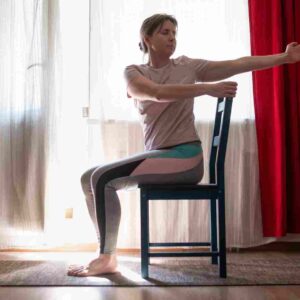Table of Contents
Introduction
Increased flexibility and motion
Stronger Core and Stability
Injury Prevention and Posture Improvement
Q&A
Conclusion
Strengthen your core, posture, and flexibility with Pilates."
Introduction
Pilates strengthens core muscles, improves flexibility, and aligns the body. It is a low-impact workout for all ages and fitness levels. Pilates engages deep muscles to enhance posture, balance, and coordination. It reduces physical stress and tension, improving well-being.
Increased flexibility and motion
Recent years have seen the rise of Pilates. Low-impact workouts develop core muscles, improve posture, and increase flexibility. Pilates is unique because it blends yoga, dance, and gymnastics. It tackles the abs, back, hips, and legs in a full-body workout.
Flexibility and range of motion are Pilates' main benefits. Pilates increases flexibility by stretching and lengthening muscles. Slow, controlled Pilates movements allow for deeper stretching and better range of motion. This helps those with tight muscles or limited mobility.
Pilates also improves joint mobility. Pilates' fluid, continuous motions lubricate and increase joint range of motion. This is very helpful for joint pain and stiffness.
Pilates also improves posture. Poor posture can cause back, neck, and headaches. Pilates strengthens abdomen, back, and shoulders for proper posture. Pilates strengthens these muscles, improving posture and reducing these health risks.
Pilates is also great for injury recovery. The moderate, controlled movements of Pilates build muscles without stressing the afflicted area. This makes it a great workout for back, knee, and other injury patients.
Pilates improves flexibility, range of motion, balance, and coordination. Pilates improves balance and coordination by requiring precision and control. This helps older persons at danger of falling.
Pilates is also great for fitness improvement. A full-body Pilates workout improves cardiovascular fitness, muscular endurance, and strength. This makes it a great workout for health-conscious people.
In conclusion, Pilates is a great exercise that improves flexibility, range of motion, posture, balance, coordination, and fitness. Pilates is a low-impact workout for all ages and fitness levels. Pilates is fantastic for recuperating from an injury, improving your health and fitness, or trying something new. Try it and see the benefits for yourself.
Stronger Core and Stability
Recent years have seen the rise of Pilates. A low-impact workout that strengthens core muscles, improves flexibility, and improves posture. Pilates is a hard and fulfilling workout that incorporates yoga, dance, and gymnastics.
Pilates works because it builds core strength and stability. The core muscles support the spine and pelvis and are necessary for optimal posture and balance. Pilates targets these muscles to strengthen and improve function.
Slow, controlled Pilates workouts activate deep core muscles. Traditional workouts disregard these muscles, although they're essential for proper posture and back pain. Pilates strengthens these muscles, improving body alignment and reducing injury risk.
Improved flexibility is another reason Pilates works. Stretching and lengthening muscles in Pilates movements improves range of motion and reduces muscle tension. This can help those who sit or stand a lot overcome the detrimental consequences of a sedentary lifestyle.
Body awareness is also improved by Pilates. Many Pilates exercises involve intense attention, which helps promote mind-body connection. This can assist stress and anxiety sufferers relax and relieve tension.
Besides these benefits, Pilates can help people with injuries or chronic pain recover. Pilates can be tailored to individual needs, helping patients rehabilitate from a variety of ailments and conditions. Pilates helps prevent future injuries by improving body strength and flexibility.
Pilates works for several reasons. Pilates is an effective way to improve core strength, flexibility, and health. By adding Pilates to your workout, you may get its many benefits.
Injury Prevention and Posture Improvement
Pilates has grown in popularity. It is a low-impact workout that strengthens core muscles, improves flexibility, and raises body awareness. Pilates improves posture, reduces injury risk, and boosts fitness.
Injury prevention is a major benefit of Pilates. Pilates strengthens the core muscles, which support the spine and pelvis. Pilates helps enhance stability and balance, reducing the risk of falls and other accidents.
Pilates improves posture and reduces injury risk. Poor posture can cause back, neck, and headaches. Pilates strengthens spine and pelvic muscles, which helps maintain posture.
Pilates also improves posture by raising body awareness. Pilates helps people become more conscious of their body and movement. This enhanced awareness can help people recognise misaligned body parts and correct posture.
Flexibility can be improved with Pilates. Many Pilates exercises stretch and lengthen muscles, improving flexibility and range of motion. Flexibility reduces injury risk and boosts fitness.
Pilates has mental benefits as well as physical ones. Pilates is low-impact and slower than other exercises. This slower speed might help people focus on breathing and body awareness. Increased mindfulness reduces stress and improves mental health.
Pilates improves posture, reduces injury risk, and boosts fitness. Pilates can help people reach their fitness goals and enhance their health by strengthening core muscles, increasing flexibility, and increasing body awareness. Pilates is perfect for beginners and advanced athletes.

Q&A
1. Why does Pilates improve flexibility?
Slow, controlled movements in Pilates stretch and lengthen muscles, improving flexibility and range of motion.
2. Why does Pilates strengthen the core?
Pilates stimulates the core by using deep abdominal muscles, back, and hip muscles to support and stabilise the spine during movement.
3. Why does Pilates reduce stress?
Pilates' breathing and mindful movement techniques reduce tension and promote relaxation. The physical benefits of Pilates can also relieve stress and tension.
Conclusion
Pilates works by strengthening core muscles, improving flexibility, and fostering appropriate posture. It emphasises controlled movements and breathing to decrease stress and promote physical and mental health. Regular Pilates improves balance, coordination, and muscle tone.


